The first thing that will probably come into one’s mind while considering source code management in 2024 is: what is GitHub vs GitLab, and which one is better? These two git-based versioning platforms – GitHub and GitLab – stand at the leading edge in the world of developers, but they have differences regarding their key features and customer needs. These differences are there to help developers, project managers, or organizations make valid decisions on which tool fits best with their workflow.
The choice between GitLab vs GitHub is anything but simple, with constantly surfacing tech backdrops. There are strengths, comprehensive capabilities, and varied pricing structures. Moreover, the fallout from Microsoft’s acquisition of GitHub and GitLab’s extreme commitment to open-source principles only complicates this decision further.
Let’s face it: choosing between GitHub vs GitLab can feel overwhelming in 2024. Both platforms are powerhouses, but their strengths cater to different needs. This guide is here to cut through the jargon and offer a clear comparison so you can make an informed decision.
Here’s where IntelliSoft’s 15+ years of experience comes in handy. We’ve seen it all, from fledgling startups to established companies. That experience allows us to provide a well-rounded perspective on GitHub vs GitLab vs Git, highlighting their strengths and weaknesses in a way that’s relevant to your specific situation.
Table of Contents
From Humble Beginnings: A Look at Git and Source Code Management
The landscape of software development pre-Git was a battleground of chaos. Version control resembled a beast, demanding cryptic handwritten notes and overflowing floppy disks. Thankfully, a savior emerged in the form of Git, a Distributed Version Control System (DVCS) that revolutionized code management. Imagine Git as a time machine for your code.
Every edit, addition, and deletion is meticulously tracked, allowing you to rewind to any point in history with ease. Unlike its centralized predecessors, Git empowers each developer’s machine to hold a complete copy of the project’s history, fostering resilience and enabling seamless offline work.
What is GitLab vs GitHub? GitHub and GitLab are platforms built upon the robust foundation of Git. They provide a user-friendly interface to interact with Git repositories, essentially folders that store your code projects. However, these platforms transcend the limitations of mere filing cabinets.
They offer a treasure trove of features designed to streamline the development workflow. Collaborative features like real-time communication tools and code review functionalities ensure everyone’s on the same page, fostering collaborative refinement and error detection.
Understanding Git vs GitLab vs GitHub: The Basics for Beginners
The world of software development can feel like building a skyscraper – complex, collaborative, and requiring the right tools for the job. That’s where GitLab vs GitHub comes in, two of the most popular platforms for version control and collaborative development.
Both platforms have witnessed a meteoric rise in popularity, driven by their robust feature sets and intuitive interfaces. From industry titans like NVIDIA and Sony to pioneering organizations like NASA and IBM, a vast array of multinational corporations and institutions have turned to these platforms to streamline their software development endeavors and empower seamless teamwork within their development teams.
While both GitLab and GitHub share core functionalities like version control and merge requests, they possess distinct strengths that cater to specific user needs and preferences. Grasping the fundamentals of these platforms is an essential first step for anyone venturing into the world of software development.
An Overview of GitLab
Launched in 2011, GitLab offers a comprehensive suite of tools that span the entire software development lifecycle. Think of it as your all-in-one DevOps command center.
Key Features
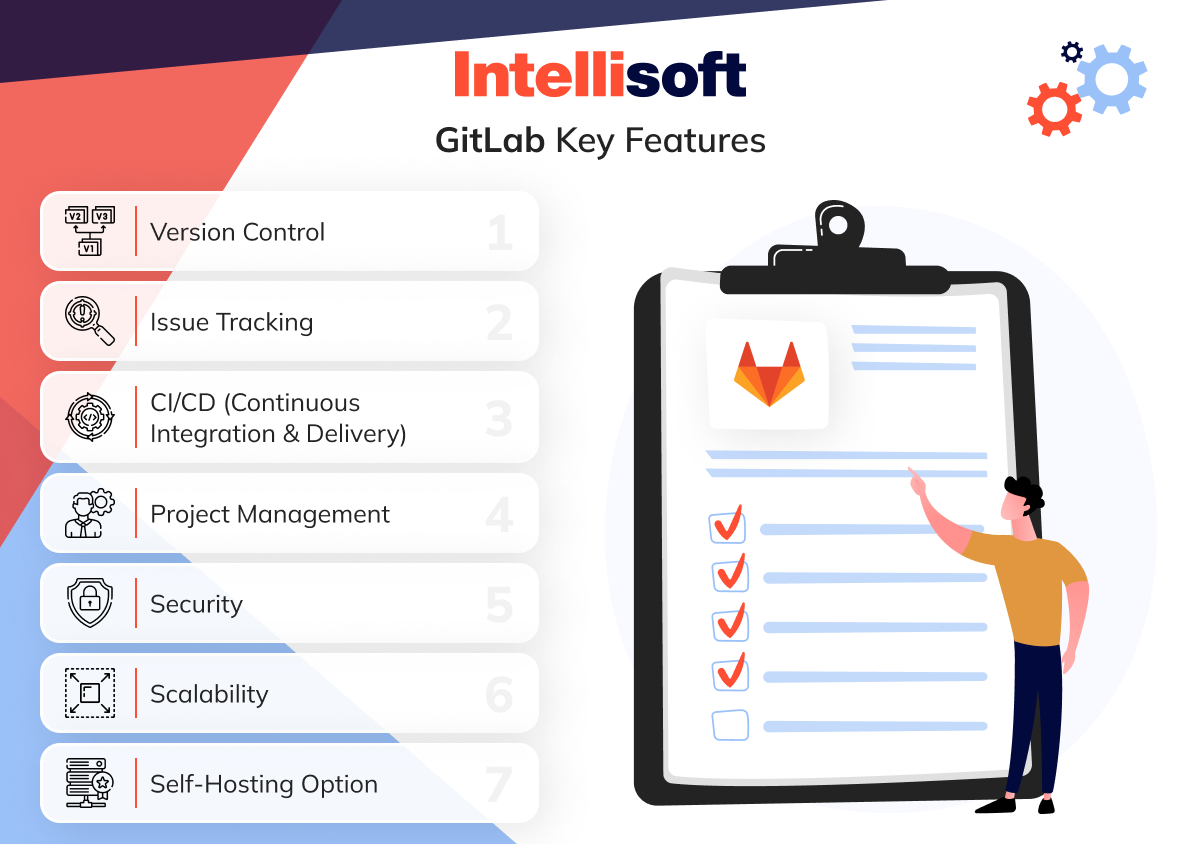
- Version Control. Like its counterpart, GitLab utilizes Git to track code changes, allowing for easy rollbacks and collaboration.
- Issue Tracking. Manage bugs, feature requests, and tasks within your project, streamlining communication and development flow.
- CI/CD (Continuous Integration & Delivery). Automate the process of building, testing, and deploying your code, ensuring a smooth and efficient release cycle.
- Project Management. Collaborate effectively with team members, assign tasks, and keep track of project progress.
- Security. GitLab prioritizes code security with built-in features like vulnerability scanning and code reviews.
- Scalability. GitLab can adapt to the needs of growing teams and complex projects.
- Self-Hosting Option. For companies with strict security or data residency requirements, GitLab can be installed on their own servers.
Used for: GitLab caters to organizations seeking a comprehensive DevOps platform. It’s ideal for managing complex projects, streamlining workflows, and prioritizing security throughout the development lifecycle.
World Leader Users: Major companies like NASA (National Aeronautics and Space Administration) leverage GitLab’s robust security features to manage their critical software projects. Siemens, a global industrial manufacturing giant, utilizes GitLab’s scalability to handle their large-scale engineering projects. Ticketmaster, the world’s leading ticketing platform, uses GitLab’s full suite of DevOps tools to manage their ticketing infrastructure and applications.
Deciphering GitHub: What Makes it Popular?
Launched in 2008, GitHub established itself as a user-friendly platform for version control and collaboration. Think of it as the bustling social hub of the developer community.
Key Features
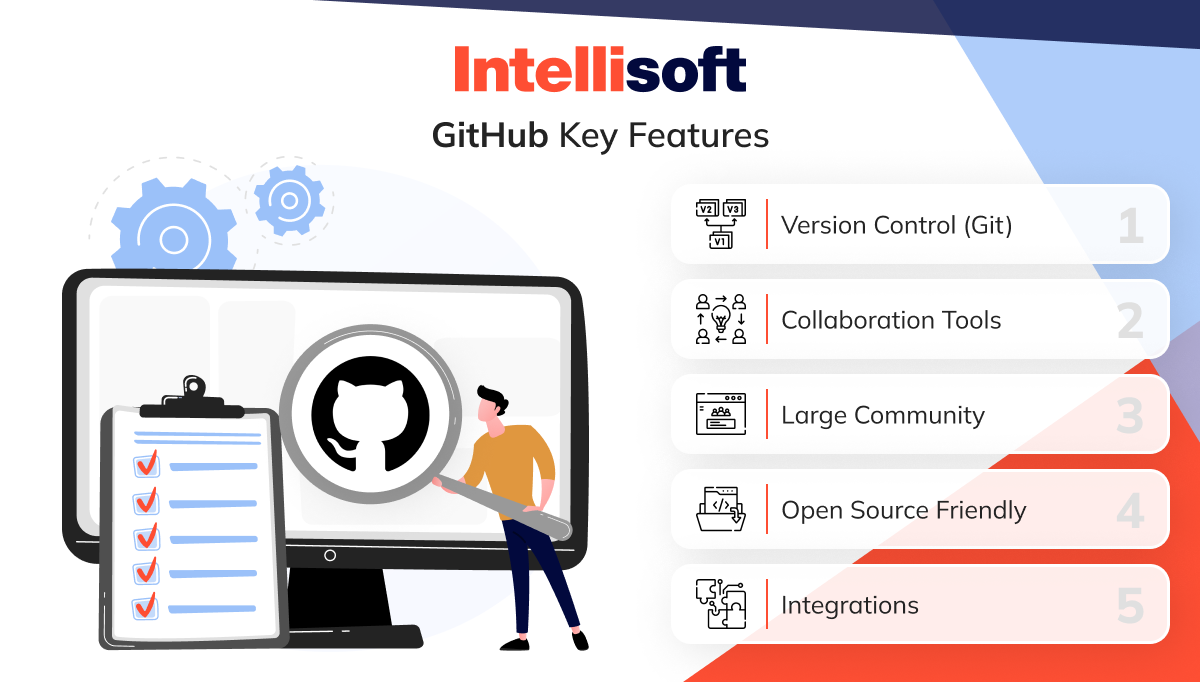
- Version Control (Git). GitHub utilizes Git to track code changes, allowing developers to collaborate and revert to previous versions seamlessly.
- Collaboration Tools. Foster communication and teamwork with features like pull requests, code reviews, and wikis.
- Large Community. Leverage the vast knowledge and support network of fellow developers.
- Open Source Friendly. GitHub is a popular platform for hosting and contributing to open-source projects.
- Integrations. Connect with various third-party tools and services to enhance your development workflow.
Used for: GitHub caters to a wide range of users, from individual developers to large organizations. It’s particularly popular for open-source projects, collaborative coding, and leveraging the vibrant developer community.
World Leader Users: Tech giants like Microsoft utilize GitHub for its collaboration tools and open-source friendly environment. Facebook uses GitHub for various projects, fostering innovation through open-source contributions. Airbnb leverages GitHub’s powerful collaboration features to manage its rapidly evolving platform.
GitHub vs GitLab: Key Similarities
Ah, version control. Remember the floppy disks and the constant fear of accidentally overwriting your code? Thankfully, those days are gone! GitLab and GitHub, the two titans of version control, work together (think complementary tools in a developer’s belt) to empower you. But choosing between GitLab vs GitHub can feel like picking a paintbrush color – both create beautiful art, but the approach might differ. Let’s explore the key similarities that make them both strong options for developers.

Shared Foundation: Version Control with Git
Both GitLab and GitHub are built upon the robust Git system, the cornerstone of modern version control. Git acts like a safety net for your code, allowing you to rewind to previous versions, collaborate seamlessly with your team, and maintain a detailed log of your project’s evolution. So, no matter the choice between GitLab vs GitHub for personal projects, you’ll benefit from the power and flexibility of Git. This shared foundation ensures a familiar experience for developers already comfortable with Git commands and workflows.
Streamlining Workflows: Project Management & Collaboration
Both GitLab and GitHub prioritize collaboration, offering features to keep your development team in sync. GitLab provides built-in project management tools like issue tracking and Kanban boards, fostering a well-organized development process. Imagine it as a supercharged to-do list, keeping everyone on the same page and ensuring efficient workflows. GitHub excels in code review functionalities with pull requests. Think of pull requests as collaborative code reviews – they allow team members to propose changes, discuss them, and ensure top-notch code quality before merging.
Hosting Your Project: GitLab Pages vs GitHub Pages
Both platforms allow you to host static websites directly from your code repository. This is a fantastic way to showcase your projects, share documentation, or even create a portfolio website! GitHub Pages offers a simple and free way to host basic websites with custom domain support. GitLab Pages provides similar functionalities with additional features for more complex website needs, like password protection and custom domain support even on free plans.
Free Plans with Unlimited Storage: A Budget-Friendly Option
A major perk for both platforms is the GitHub vs GitLab pricing and availability of free plans with unlimited private repositories. This allows you and your team to experiment with version control and collaboration features without significant upfront costs. Both GitLab and GitHub offer a gentle entry point into the world of professional development, allowing you to try them out and see which platform best suits your workflow and preferences.
Ultimately, the best platform depends on your specific needs and priorities. If you require a comprehensive suite of built-in functionalities like project management and CI/CD, GitLab might be the ideal choice. However, if a user-friendly interface and a strong focus on open-source collaboration are your top considerations, GitHub could be the perfect fit. No matter which platform you choose, both GitLab and GitHub offer a powerful foundation for version control and streamlined development workflows.
Related Readings:
- Node JS Advantages and Use Cases: Is This Environment Right for You?
- Making Sense of Databases: How to Choose the Right One
- Become a Master of Tech Due Diligence: a Comprehensive Guide
- Time-Saving Success: Crafting the Perfect Scheduling App from Concept to Launch
- Understanding SignalR: Concepts, Features, and Usages
GitHub vs GitLab: Key Differences and Unique Features
Let’s explore the key distinctions between GitLab vs. GitHub:
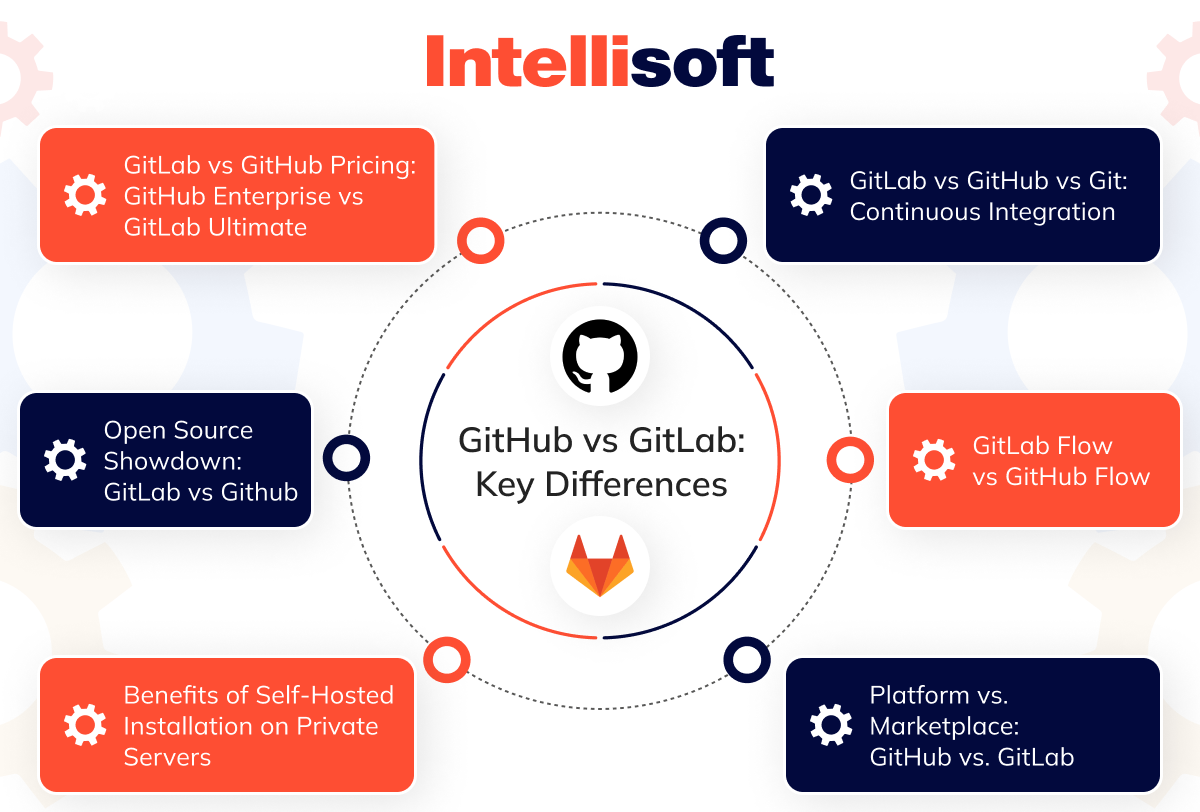
GitLab vs GitHub vs Git: Continuous Integration
GitLab. Embraces a fully integrated CI/CD (Continuous Integration and Delivery) pipeline. Imagine a tireless worker bee, meticulously building, testing, and deploying your code – that’s GitLab’s CI/CD in action. This streamlines development, minimizes errors, and frees your team to focus on innovation.
GitHub. Relies on external integrations for CI/CD functionality. Popular options like Jenkins, CircleCI, and Travis CI offer flexibility, but setting them up can be like assembling a complex IKEA bookshelf – it might require additional effort and expertise.
GitLab Flow vs GitHub Flow
GitHub Flow. Champions a lightweight branching approach with frequent pull requests. Think of it as rapid-fire collaboration, ideal for fast-paced projects where agility is key. However, for intricate projects with strict branching protocols, it might not be the most suitable choice.
GitLab Flow. Advocates for a more traditional branching model, utilizing feature and release branches. This method provides greater control over the development process, ensuring a clear roadmap for your code’s evolution. However, it might seem less intuitive for beginners compared to GitHub Flow’s streamlined approach.
When considering Git Flow vs GitHub Flow vs GitLab Flow, each approach caters to different workflow preferences and project complexities, offering distinct branching strategies to suit varying development needs.
Platform vs. Marketplace: GitHub vs. GitLab
GitHub. Primarily functions as a platform for hosting code repositories and fostering project collaboration. It offers a curated selection of built-in tools and features. However, a vast ecosystem of third-party integrations acts like an expansive marketplace, significantly extending its functionality. Imagine it as a core application with a thriving app store.
GitLab. Positions itself as a comprehensive DevOps platform, boasting a wide range of built-in features for project management, CI/CD, security, and more. It’s like an all-in-one suite, minimizing reliance on external integrations. However, the selection of third-party tools might be more limited compared to GitHub’s extensive marketplace.
Benefits of Self-Hosted Installation on Private Servers
GitLab. Provides the option of self-hosting the platform on your own servers. This grants you ultimate control over security, data privacy, and customization. But remember, great power comes with great responsibility – setting up and maintaining a self-hosted GitLab instance requires significant technical expertise.
GitHub. Primarily operates as a cloud-based solution. While offering high availability and scalability, it doesn’t have self-hosting capabilities. This means your data resides on their servers, which might not be ideal for organizations with stringent data privacy requirements.
Open Source Showdown: GitLab vs Github
GitHub. Renowned for its massive open-source community, boasting a vast library of publicly available projects. This fosters collaboration and learning for developers, but it doesn’t necessarily translate to superior functionality for private projects.
GitLab. Offers both free and paid tiers for private repositories. While its open-source community is smaller, it provides a robust platform specifically designed for private development, bolstered by strong security features.
GitLab vs GitHub Pricing: GitHub Enterprise vs GitLab Ultimate
GitHub Enterprise. GitLab vs GitHub enterprise offers a scalable, on-premise version of GitHub with additional features for security and compliance. Imagine it as a supercharged, private version of GitHub, ideal for large organizations with strict data privacy requirements.
GitLab Ultimate. Represents the top tier of GitLab, providing access to all features of the platform, including advanced security, compliance tools, and enhanced scalability. Think of it as the ultimate DevOps toolkit for organizations seeking a comprehensive in-house solution.
GitHub vs GitLab vs Bitbucket
When evaluating version control and DevOps platforms, GitHub vs GitLab vs Bitbucket frequently emerge as the leading contenders. Each platform offers a distinct set of features, pricing models, and GitHub vs GitLab market share. For a deeper dive into Git vs GitHub vs GitLab vs Bitbucket and to evaluate how each platform aligns with your specific requirements, it’s important to consider the features, pricing, and community support each of them offers.
Let’s compare GitLab vs Bitbucket vs GitHub:
Key Features Comparison: GitHub vs Bitbucket vs GitLab
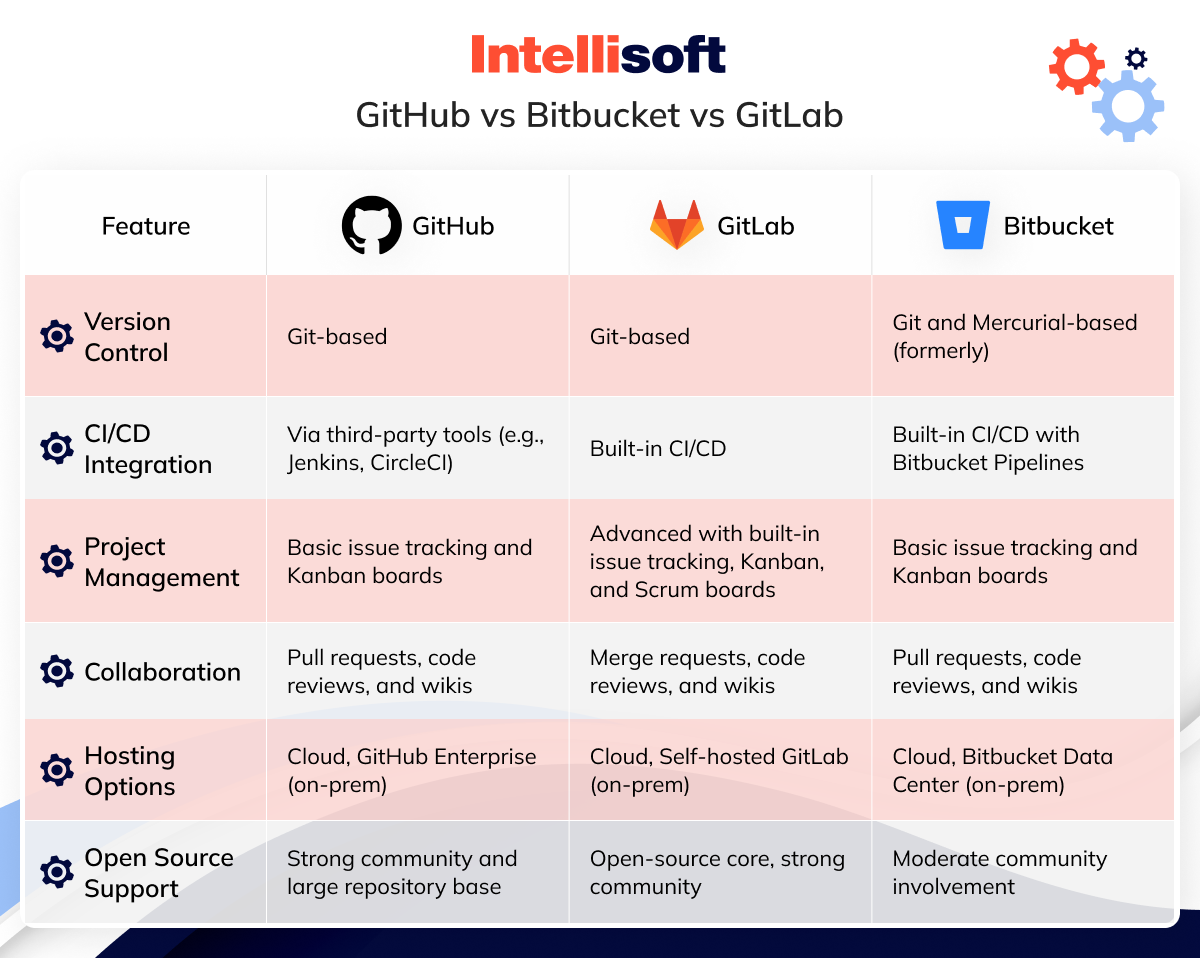
Pricing Comparison: Bitbucket vs GitLab vs GitHub
GitHub vs GitLab vs Bitbucket Pricing varies significantly based on the services and features offered.
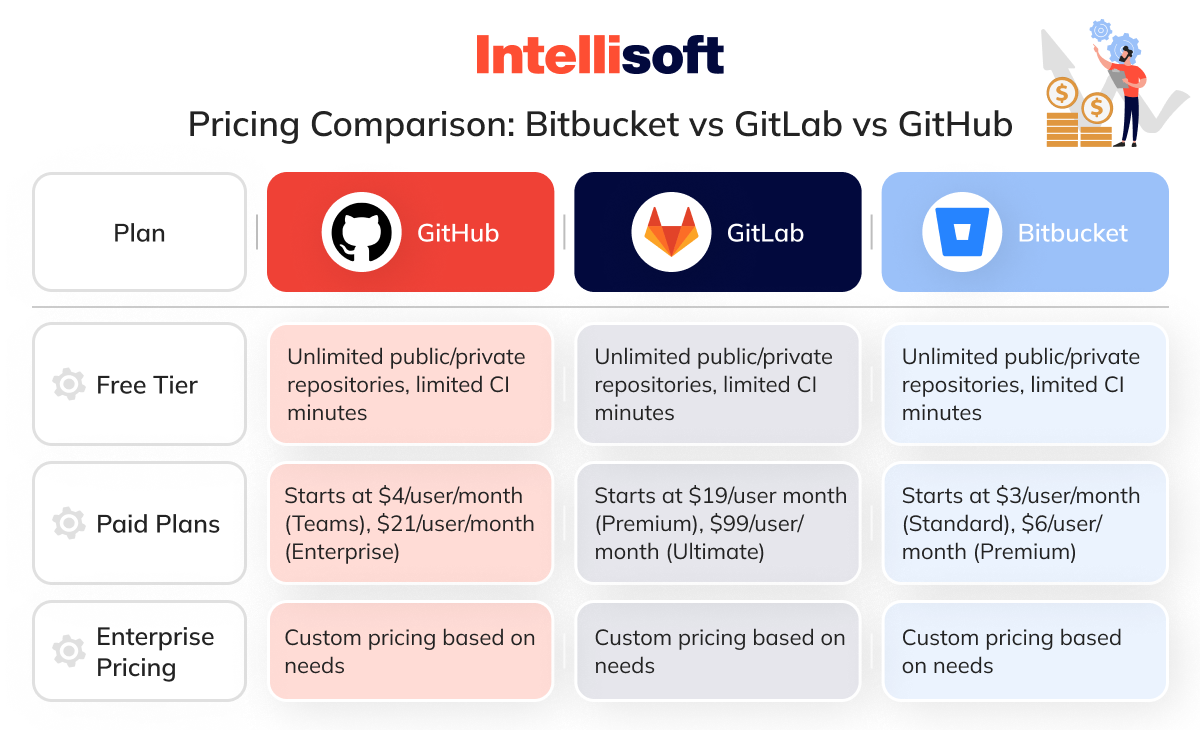
Bitbucket vs GitLab vs GitHub Market Share and Usage
GitHub vs GitLab vs Bitbucket market share showcases the popularity and adoption rate among developers and organizations.
GitHub
- Market leader with a vast user base.
- Widely adopted by open-source communities.
- Popular among both small projects and large enterprises.
GitLab
- Strong growth trajectory with comprehensive DevOps integration.
- Preferred by organizations looking for an all-in-one solution.
- Significant adoption in enterprise environments requiring robust security and compliance.
Bitbucket
- Favored by teams using Atlassian’s ecosystem (e.g., Jira, Confluence).
- Moderate market share with strong integration capabilities.
- Popular in small to medium-sized enterprises.
Specialized Features: Bitbucket vs GitHub vs GitLab
GitHub
- Extensive third-party integrations.
- Strong community and open-source project support.
- GitHub Actions for CI/CD.
GitLab
- Comprehensive built-in CI/CD tools.
- Advanced project management features.
- Enhanced security and compliance options.
Bitbucket
- Bitbucket Pipelines for CI/CD.
- Seamless integration with Atlassian tools.
- Support for both Git and Mercurial repositories (historically).
When considering GitHub vs GitLab vs Bitbucket, each platform has its own strengths and unique offerings:
- GitHub is ideal for those who prioritize a vast community, extensive third-party integrations, and robust open-source support.
- GitLab is the go-to choice for organizations seeking an all-in-one DevOps solution with advanced CI/CD capabilities and comprehensive project management tools.
- Bitbucket shines for teams heavily invested in the Atlassian ecosystem, offering smooth integration with tools like Jira and Confluence.
GitLab vs GitHub vs Bitbucket vs Azure DevOps
For those considering even broader options, comparing GitLab vs GitHub vs Bitbucket vs Azure DevOps can provide additional insights, especially for organizations heavily invested in the Microsoft ecosystem. Azure DevOps offers robust integration with other Microsoft services, making it an attractive choice for enterprises looking for seamless connectivity across their development and operations pipelines.
By evaluating GitHub vs GitLab vs Bitbucket vs Azure DevOps, you can determine which platform best fits your development workflow, security requirements, and integration needs.
Wrapping Up
In the ever-evolving world of coding, choosing between Git vs GitHub vs GitLab can feel like picking a travel companion. Do you crave the energy of a bustling city filled with fellow developers eager to share knowledge and collaborate? Then GitHub might be your perfect match – a vibrant community hub where open-source projects flourish.
However, maybe you’re a lone wolf developer who prioritizes efficiency and security. You yearn for a streamlined platform that integrates seamlessly with your workflow, like a well-worn backpack packed with all the tools you need for any adventure. That’s where GitLab excels – a comprehensive suite designed for a smooth development journey.
Ultimately, the decision hinges on your project’s needs and whether you are choosing between GitHub vs GitLab for personal use or enterprise. Does it demand a lively atmosphere brimming with collaboration or the quiet efficiency of an all-in-one toolkit? No worries if you’re still feeling lost on the path.
At IntelliSoft, with over 15 years of experience guiding diverse developers, we can offer a well-rounded perspective and choose between GitHub vs GitLab CI/CD. Think of us as your trusty travel advisors – we can help you chart the perfect course for your development journey, selecting the platform that best fits your goals. Don’t hesitate to reach out – our team is here to support you every step of the way, ensuring your development project reaches its successful destination.










